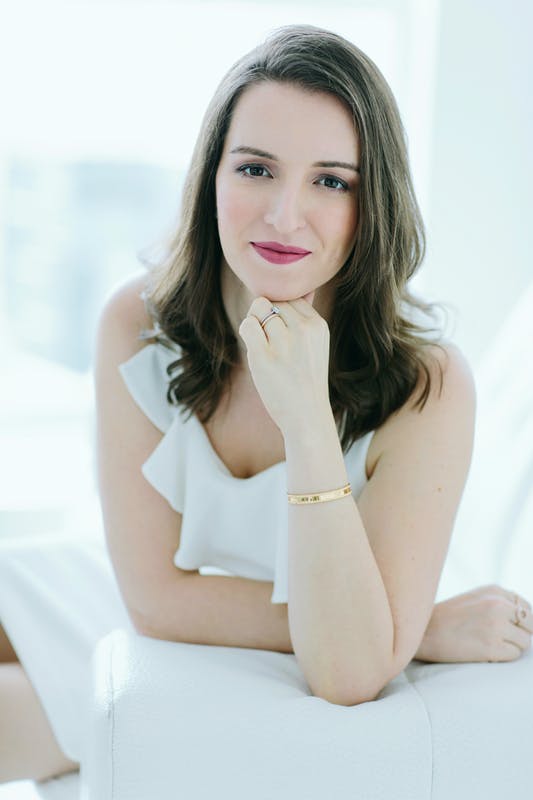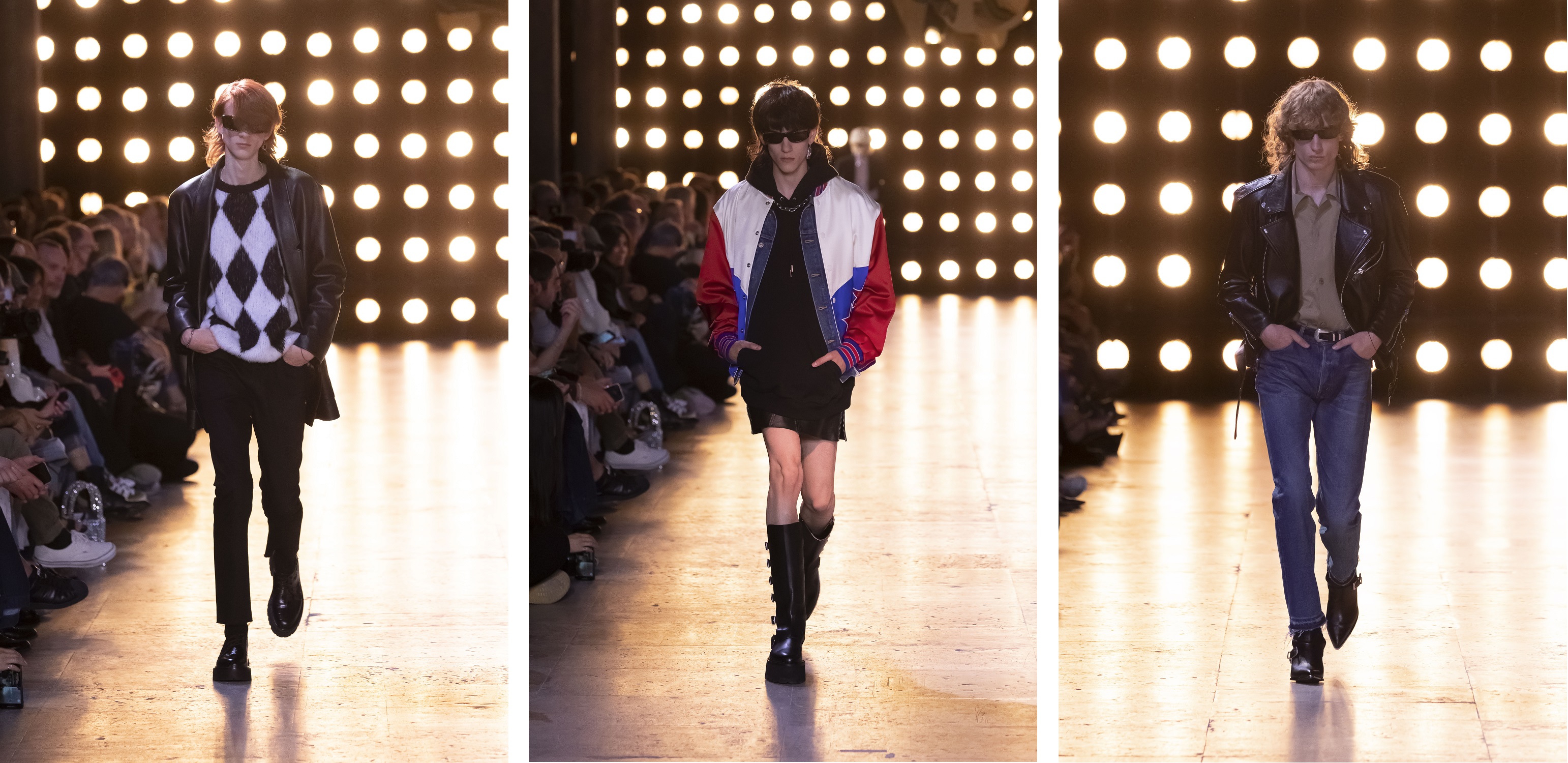#INTERVIEW: Daisy Sleiman - Creating A Community

Daisy Sleiman is Dubai based Lebanese fashion designer. After graduating at the Paris College of Art (PCA), she started showing her Ready to Wear collections DNR by Daisy during Paris Fashion Weeks.
As Daisy is developing her brand, we talk with her about her experience studying in Paris, her work and inspiration, and about her future plans.
When asked what advice she would like to share with anyone interested in studying fashion, Daisy answers: “Do it! Don’t let anyone tell you no!”
Tanja Beljanski: Please tell us about your background and what motivated you to decide to study fashion design at the Paris College of Art? What does Paris represent for you?
Daisy Sleiman: I was raised in Dubai for the most part of my life. Growing up, I’d often find myself surrounded with unimaginable amounts of A4 papers that my mother would get from her job working as a schoolteacher. I would use these to sketch. I used to sleep wearing my school uniform every night and wake up at 5am just so I would have enough time to watch the Disney Channel and sketch what every character was wearing.
This started roughly around the age of 7, but I always knew I was destined for fashion as any time before that I wouldn’t engage in much conversation unless it was about discussing clothes, especially when people would come up to me and ask for my opinion regarding their outfits. I even used to put my mum’s clothes together when I was 6 years old, as I found it rather important to have her outfits checked before she headed out.
I transferred from the Lebanese American University after the devastating events we had to endure back in Lebanon. As our country was slowly falling apart, I had no other option but to leave. I started my search for universities, focused on ones that were English-speaking and would really push my creative side, and that’s when I came across PCA. Moreover, it was the ease and comfort that PCA provided me with alongside its beaming positive energy that I could feel all throughout the process that strongly made PCA stand out from other universities.
To me, France always reminded me of home. I can sense Beirut wherever I go around here. As for Paris specifically, it represents hardship. Ever since I moved here, I have experienced hardships in forms I am unfamiliar with in comparison to those I used to experience in the Middle East. My priorities shifted once I moved; I started caring about things that I didn’t care about back home simply because they weren’t available to me then. I would not deny that there are many hardships, but here in Paris I was able to be rewarded with equal amounts of success, and that’s what makes it all worthwhile.
___________________________________________
"PCA helped me grow and opened a space
for me to connect with greatly talented people."
__________________________________________
TB: What are the best lessons you learned at the PCA when it comes to the fashion industry?
DS: The first lesson that stuck with me, as cliché as may sound, is to always go with your first and initial thought. Truthfully speaking, whenever I had an idea about a certain topic, approach or execution in PCA I would try and jump around different ideas, but would always land on the same one I started with. So, just stick with your gut feeling when it comes to your creative approaches and just go with it, simply embrace it.
The second lesson I would say is that the more people dislike your work and project negativity, the more drive you possess within your work. Always use this energy as fuel for motivation: the more people said no to me, the more I said yes to myself.
TB: Would you recommend studying at the PCA and why?
DS: Yes, because with all the good and the bad PCA helped me grow and opened a large space for me to connect with greatly talented people who themselves have so much experience and motivation that aided me with my work. I believe everyone should have this type of experience in fashion studies, as back home I didn’t have the same freedom of creativity or speech and I can well imagine how many other places would be like that. I personally prospered so much in my time at PCA, both mentally and professionally.

____________________________
"I want to create things that
everyone can relate to."
_______________________
TB: How did you come up with the idea of creating your brand?
DS: I always had this idea that I had to create something that everyone can relate to and was determined to do it by connecting everyone through fashion. I loved the idea of giving clothes a second chance and even tried to do that back home by trying to make fashion affordable for everyone through reselling and repurposing. I believe that motto stayed with me throughout the entire process of trying to start my own brand as a fresh graduate, which is the main inspiration behind my work: I want to create things that everyone can not only wear but also relate to. I am not simply talking about inclusivity, but rather creating a community where everyone shouldn’t look to be accepted and loved: a community where you simply believe you already are right off the bat.
To be honest, I am doing it for myself and not just for others, as it stems from my own experiences. My personal life is narrated through the clothes I design. A lot of my work is based on innovative techniques, more specifically those involving textile manipulation, which is what I precisely mean by “second life”. Not just repurposing it, but rather creating something from nothing. Things that I ask myself when looking at a fabric would be: “How would I alter this?”, “How can I make it unrecognizable to people?” or “How far off the starting point can I get this fabric to?”, because these are the questions that invite me to think beyond expectations; they invite me to grow my thinking into something bigger every time.
TB: What is a story behind your brand?
DS: This is a heavy story of someone who comes from a largely mixed background; one that is heavier than words can translate. I was born in Lebanon, I lived in Dubai for most of my life and moved back to Lebanon in my late teenage years only to find myself moving again to Paris a few years after. Having to do all of that at 21 is something that has shaped me differently. I want to create something meaningful, expressive, yet relatable. I want to ensure transparency: what you see is what you get, because, truthfully, fashion was always a necessity, but we found ourselves spinning it into something way more luxurious which made it turn into a new way of life.
My work aims at showcasing problem-solving through alterations of pattern works, fabric manipulations, textile handling, and many other innovative techniques deployed to tackle new ways of expression. My brand aims to give you fashion that can be worn on a good and a bad day, one that may be used as casual or fully formal, and one that simply suits your liking. I would’ve liked to say that this would be a one-of-a-kind brand, but nothing really is in this modern day. So, what I would confidently say is that it is a reflection of itself within other works, and what it offers is the focus on the luxury of simply living.

____________________________
"My personal life is narrated
through the clothes I design."
____________________________
TB: How do you design? What form do your earliest ideas for a collection take?
DS: I can easily say that I design when I’m within an artistic setting: be it when I am listening to music, watching TV or attending an art gallery. Any given setting that would involve creativity, or just a day full of new events or productive experiences, would always have me come back home with a rush of ideas. I truly believe that spending a lot of time with other people helps me put together a collection in my head, as that is usually the earliest stage of my design process. Being with people and interacting with them strongly aids me in envisioning the collection, the editorial, and really just the whole gist of it.
After having that sort of brainstorming, I slowly start breaking down my vision into smaller parts in order to focus on them, always starting with the mood and aesthetic of the message I am trying to convey. Then, I start gathering research to understand what might mix with what, combining the mental vision with the material approach, but constantly keeping in mind the message I hope to communicate and picking out elements that might support this message as much as possible, be it through prints, colors, fabrics, textiles, cuts, etc.
Frankly, conversational aspects are what make my idea turn into a concrete one: it is when I say it out loud that it turns from vision to reality. But it is only when I start seeing materials and investigating them that I initiate the true process of my end result.
TB: Could you tell us a little bit about some of the upcoming projects for your label?
DS: One of the most recent ideas that has occurred to me is largely supported by the fact that I was moving houses. When I was moving, I came across a few things that I had kept from PCA and I had swiftly put together what I would do with what I had found. What I can say at the time being is that it’s going to be 100% recycled and sustainable. It’s going to have it all, with a large emphasis on ALL.
Makeup Artist: Sarah Debs
Talents: George Kazan, Aya Daher, Gabriella Rizk and Ali Nesr
Photographer: Lynn Marji
Courtesy of Daisy Sleiman and DNR by Daisy
* This story has been published in the December 2023 issue of L'Officiel Arabia.

.jpg)








